'I live in a church to prevent being deported'
- Published
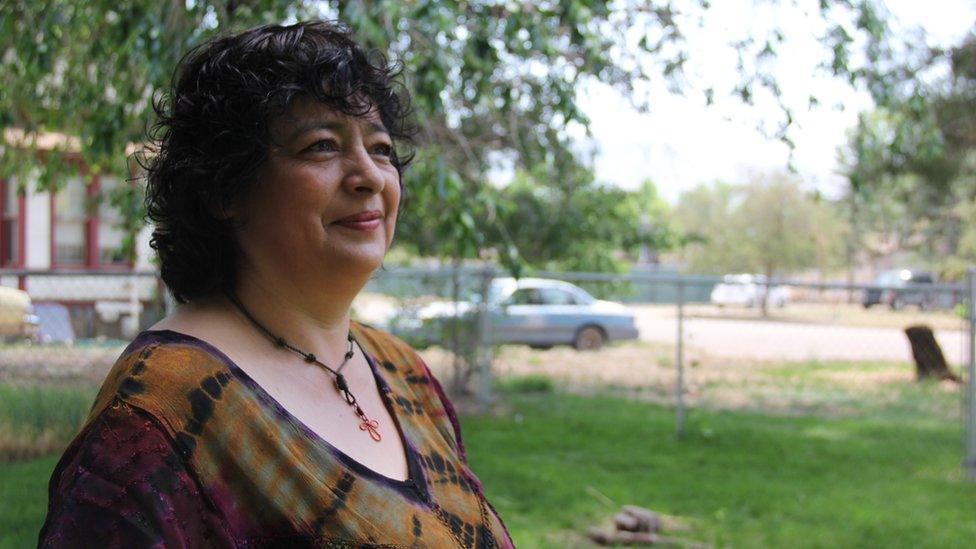
Across the US, dozens of undocumented immigrants have taken refuge in churches to avoid deportation. For one woman in Colorado, her 14 months in sanctuary have taken a heavy toll.
After midnight in the garden of Mancos United Methodist Church, Rosa Sabido can enjoy a bit of solitude.
Mancos is quiet and dark at night, a one-traffic light, two-coffee shop town in southwest Colorado at the edge of where the Rocky Mountains meet desert mesas.
"I spent a lot of time at night here, trying to watch the moon and the stars - my little piece of sky," says Rosa.
One evening, a family of deer came by, and baby raccoons were nesting in a tree.
During the last hunting season, she heard animals separated from their packs in the hills nearby.
"I heard their cry and it was like 'Oh gosh', I cried with them, because I could truly relate to that."
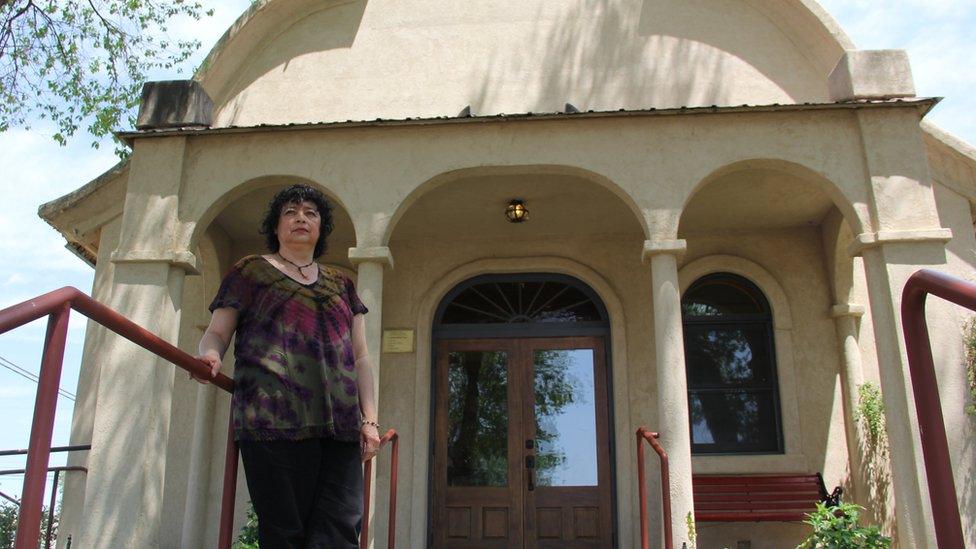
Rosa, 54, has not left the church grounds since 2 June 2017.
She sleeps in the church's community building, where a former nursery has been converted into a makeshift bedroom. She walks the dozen feet or so to the church itself to attend Sunday services.
She watches where she steps as she waters the plants in front of the church, so as to not cross the property line. For more than a year, her entire physical world has been no bigger than a quarter of a football pitch.
Rosa lives here because she fears arrest by officers from US Immigration and Customs Enforcement (ICE) and ultimately deportation to Mexico where she was born.
She is one of nearly 50 people who live in churches in the US to avoid deportation - a long standing ICE policy discourages immigration arrests in "sensitive locations" like churches and schools.
It is an extreme option and one that extracts a high and potentially lasting price.
Rosa keeps busy but her time in the church is about waiting - waiting for a new Congress, waiting for a potential private bill, waiting for a different president.
And it is likely she will have a long time to wait. Even if a more sympathetic Congress is elected this autumn, she will need a series of miracles to return to her life as she lived it before.
But Rosa is a believer in miracles.

Her American story began 30 years ago, when she first started visiting her family in the US when still a young woman in her 20s. Both her mother and stepfather were beneficiaries of a legalisation drive in the 1980s, but Rosa was not eligible.
She began spending more time in the US with them and for almost 20 years - through shifting laws and policies, bad legal advice and an attempt to represent herself in court - Rosa tried to become a lawful resident, driven by a determination not to be separated from her family in Colorado.
In 2008, she was arrested by ICE, but released with an order of supervision.
Throughout the next few years, the Obama administration increased deportations to record numbers, but these were mostly recent border crossers.
In 2011, with the help of an immigration lawyer, Rosa received her first year-long stay of removal. She was already a secretary at a Catholic parish in Cortez, and sold tamales around the area, including the Mancos farmers' market, where she became a fixture.
She continued for like that for six years, checking in with the regional ICE office, until 2017.
Her immigration lawyer, Jennifer Kain-Rios, thinks stories like Rosa's represent how difficult it is for people to understand "what their position is in front of the law".
"It's very unforgiving - and in order to ask for and receive a benefit, you have to have a perfect immigration history and there are very few exceptions to that."
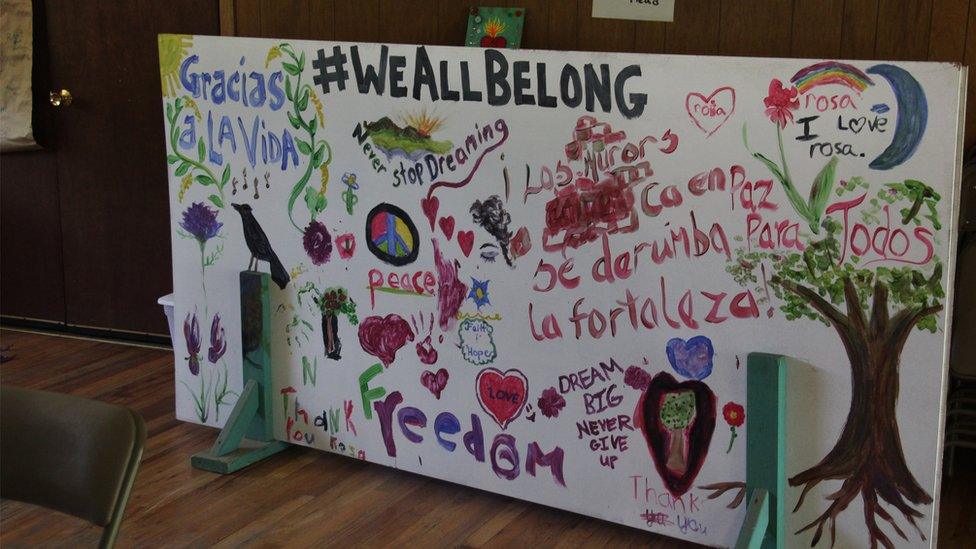
A sign made in honour of Rosa's anniversary at the church
In 2017, Rosa's stay of removal - her seventh - was denied.
ICE considers a stay of removal as a temporary benefit, a way to get the person's affairs in order before deportation. When asked why a one-year stay was approved six times in a row for Rosa and then denied, Carl Rusnock, a spokesman for ICE's central region, cited "different policies in place under a different administration".
It became "very, very clear early in 2017" Kain-Rios says, that ICE's choices about who was being prioritised for deportation had changed under President Trump, buoyed by strong support among his voters for his election promise of an immigration crackdown.
Another client of Kain-Rios had been detained at her check-in. This year, a man who lived in a nearby town with a family of US citizens and a business that employed more than a dozen people had also been detained. He was deported to Honduras.

Other voices on immigration crackdown

But Rosa wanted to stay in Colorado - she considered it her home, and she was one of the few people nearby who would take care of her mother, who had been in poor health.
Sanctuary, Rosa says, was her best option.
"It could be either here or turn myself into ICE and be detained and held in custody and eventually be deported."
ICE now considers Rosa a fugitive.
She entered the country illegally and ignored multiple orders to depart before she was granted the first stay, Rusnok said in an email.
"She has exhausted her appeals from the immigration and appeal courts and from ICE," he says.

The night Rosa arrived at the church she hoped that things would eventually change. "I truly didn't think it was going to be a whole year - or more."
But she really didn't know what it would mean.
"I was told it would change my whole life radically - I had to let go of the things I used to do. Truly enough that's what happened."
A few months before, Mancos United Methodist Church had taken a vote among its congregants on whether the church was willing to become a sanctuary church - to take in someone at risk of deportation.
Pastor Craig Paschal says it was a natural development for their church and for Mancos.
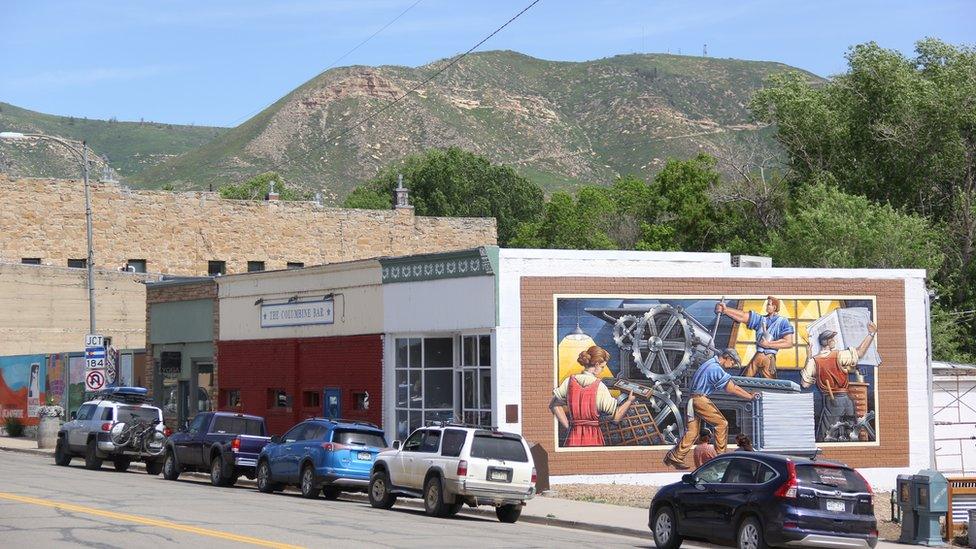
Downtown Mancos
"The community itself has always been very welcoming, a very inclusive place to live, very accepting of new ideas." he says. "That's what's led us to sanctuary."
But sheltering Rosa was never the original plan. The church had spoken to a nearby organisation that believed there were a handful of families in the area at risk of deportation, all of whom had lived there for at least 10 years.
"They were our brothers and sisters," he says.
A few people left the church over the decision, but more have joined in support of Rosa, says Paschal.
"This is going to challenge us, but this is what it means to love our neighbour."
A friend of Paschal told him there was a woman who lived in the next town over who believed she was about to be deported.
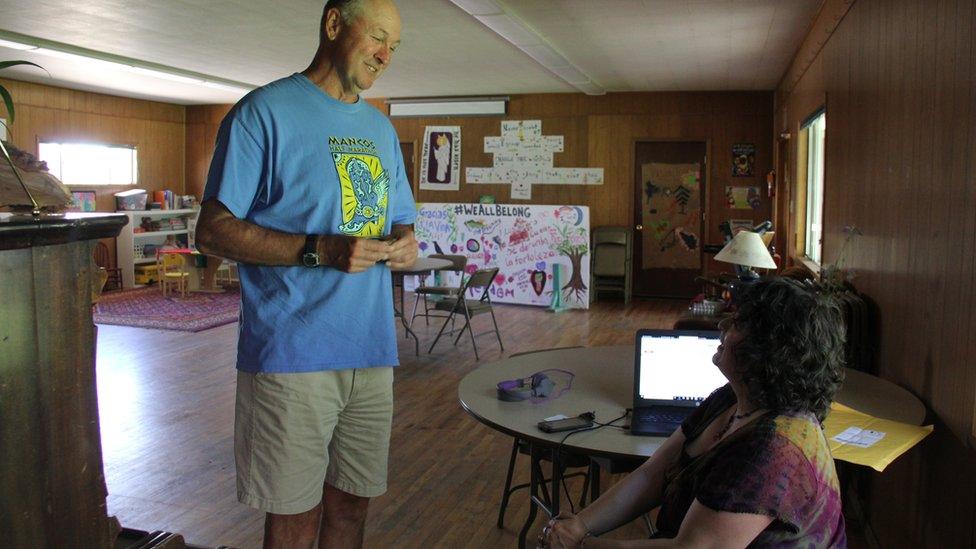
Pastor Craig Paschal and Rosa inside the church's community hall
"I knew Rosa, I knew her by name - she had actually been to our house selling tamales - and it just hit me, because it was very personal."
Rosa packed up her things - her clothes, her laptop, her immigration files, her religious statues and images - and moved into the church.
Paschal and a group of supporters from Mancos went to the ICE regional office in Rosa's place for her appointment, informing them she had taken sanctuary.
"Rosa is not hiding," Kain-Rios says.

On the year anniversary of Rosa's first night in sanctuary, the normally quiet garden outside her window was filled with dozens of people.
There was music, face painting for children and food.
On a wooden cross, Rosa and guests attached milagros, small silver-coloured objects representing prayers and other intercessions against their burdens.
Three hundred and sixty five days and counting, Rosa has something like a routine.
She checks messages on the "Rosa Belongs Here" Facebook page. She makes tamales by order and cooks when people come to attend activities like yoga and jewellery-making with her.
Every week she talks to other people in sanctuary on video conference, including three other women in Colorado. The four of them are trying to build a case they can take to Colorado legislators to help their plight.
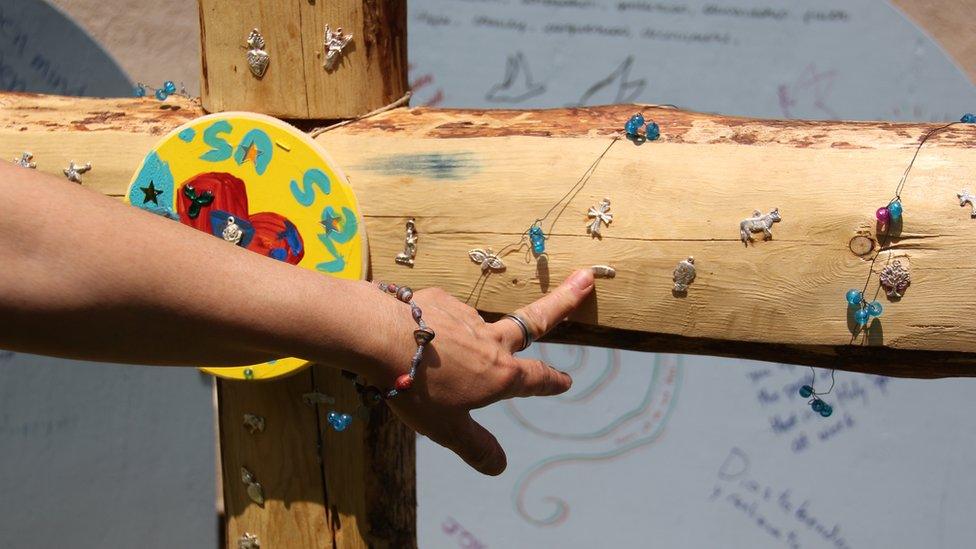
She attends the church's weekly Sunday service but she misses the Catholic Mass, so every week a priest comes to give her communion.
It's one of the things she's lost by deciding to move into the church.
"My space, my life, my family, my home, my time, my work, my dreams, my future, you know everything," she says. "Everything is gone."
She pauses. "Everything is gone."
How long can she stick it out? How long can the church host her?
Rosa says she's never considered leaving. "This is a commitment I've made," she says.
"I've been trying all this time to become a citizen... I just tried to do the legal thing and in the end all I get was an order of deportation - I think that's not fair, I think that's wrong. I truly believe I deserve better, I'm not a criminal, I have no criminal records, I've been a productive person."
The commitment to stay is "beyond my needs now", she says. "If I give up I'm sure I'm going to be sorry the rest of my life."

Trump supporters talk family separations and border security

Paschal says they can keep going.
"I think we have the truth on our side that we need each other, we need Rosa, we need the immigrant community."
But when your home is a public community space for a close-knit church, it can be hard to find privacy.
"There's a time when you get home or when you're driving when it's your time, quiet time... it's just a big change," she says.
Joanie Trussell is not part of the congregation, but she got involved because of Rosa's sanctuary.
"It's a new thing for all of us, no one knows how to do this," she says, saying there's been a learning curve for the community that's supporting Rosa.
The biggest thing, she says, is learning "how to be an ally".
"How to not step in and take charge and kind of suggest on any level we know what's best for Rosa," she says.
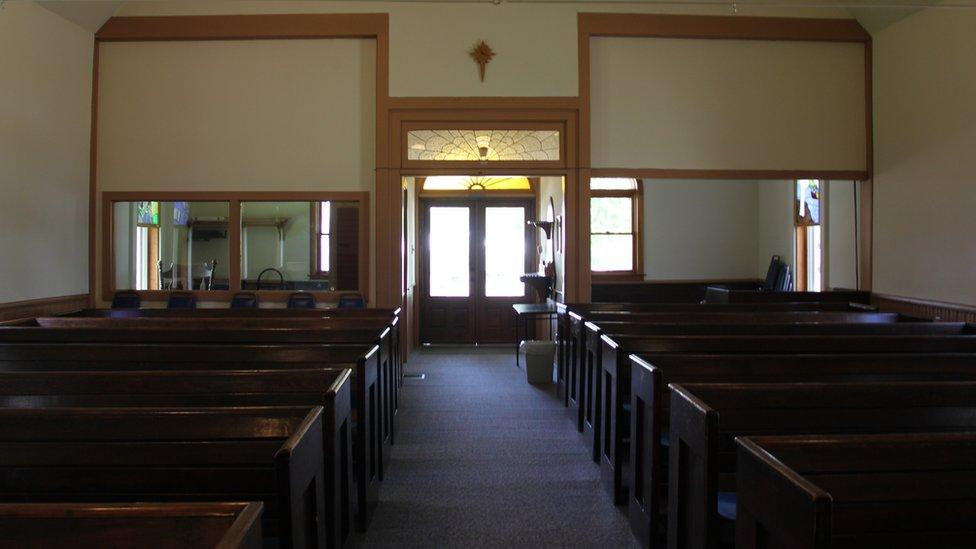
Inside the church hall
Rosa says it's nice to talk to the other people in sanctuary because very few people understand what they are going through.
Putting herself out there as a representative of the estimated 11 million undocumented people who live in the US makes her proud, and practically, gives her something to do. But it's draining.
"I never had that much attention my whole life and people expect a lot from us," she says.
"It's a big responsibility, but at the same time I'm good with it. I know it's hard for others to stand strong. There are people who are not willing to be in public."
Her faith in God gives her hope, she said in June. So she will wait.
In late July, Rosa posted on Facebook that her mother had died unexpectedly during her first chemotherapy treatment for breast cancer.
She could not attend the funeral in Mexico, so she watched via video conference and looked at photos.
"My beloved mom is gone," she wrote in a post showing her mother's casket. "The reason of my sacrifice is gone forever."
Family separation, she says, is not just about young children and their parents.
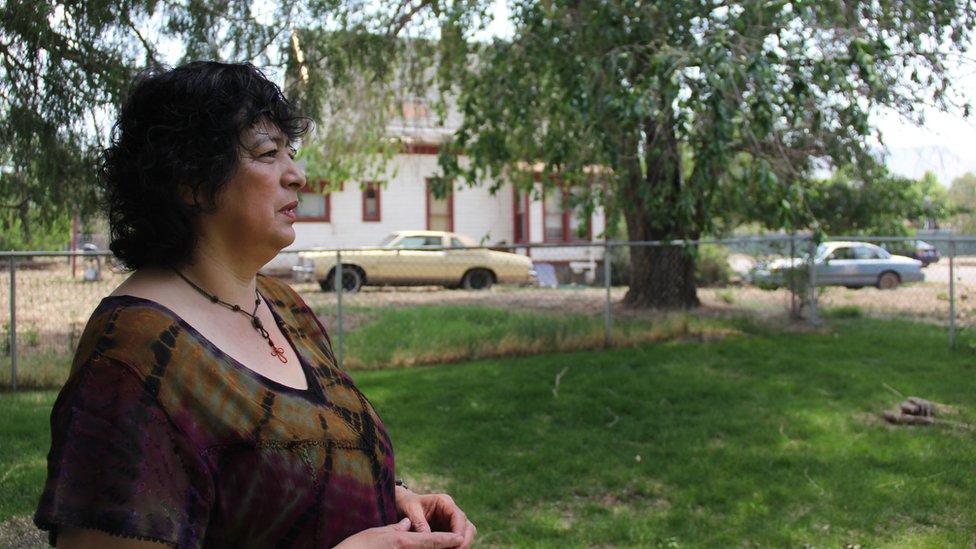
Despite her mother's death, Rosa intends to stay in sanctuary. She doesn't see a future for herself in Mexico.
"I need to stay here because if I give up, this is not going to work the way I want it to, which is keep raising awareness to show how unjust this.
"I still want my freedom. I just want to keep fighting for justice, and I'm not in a hurry."